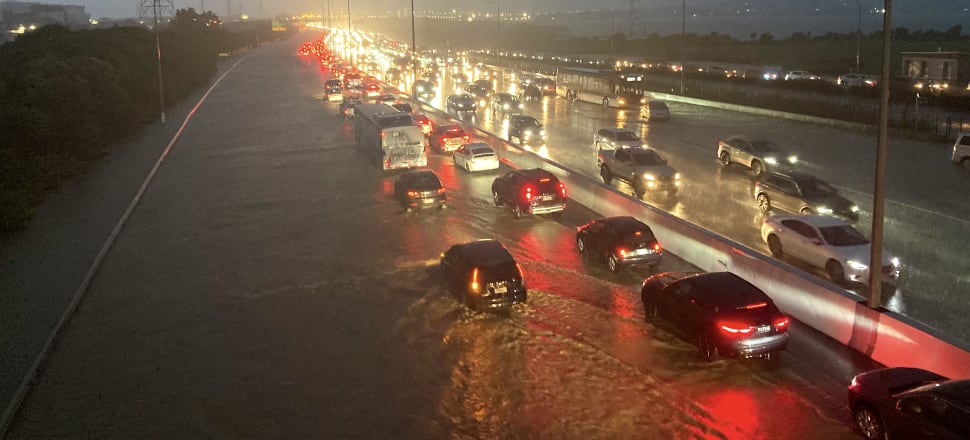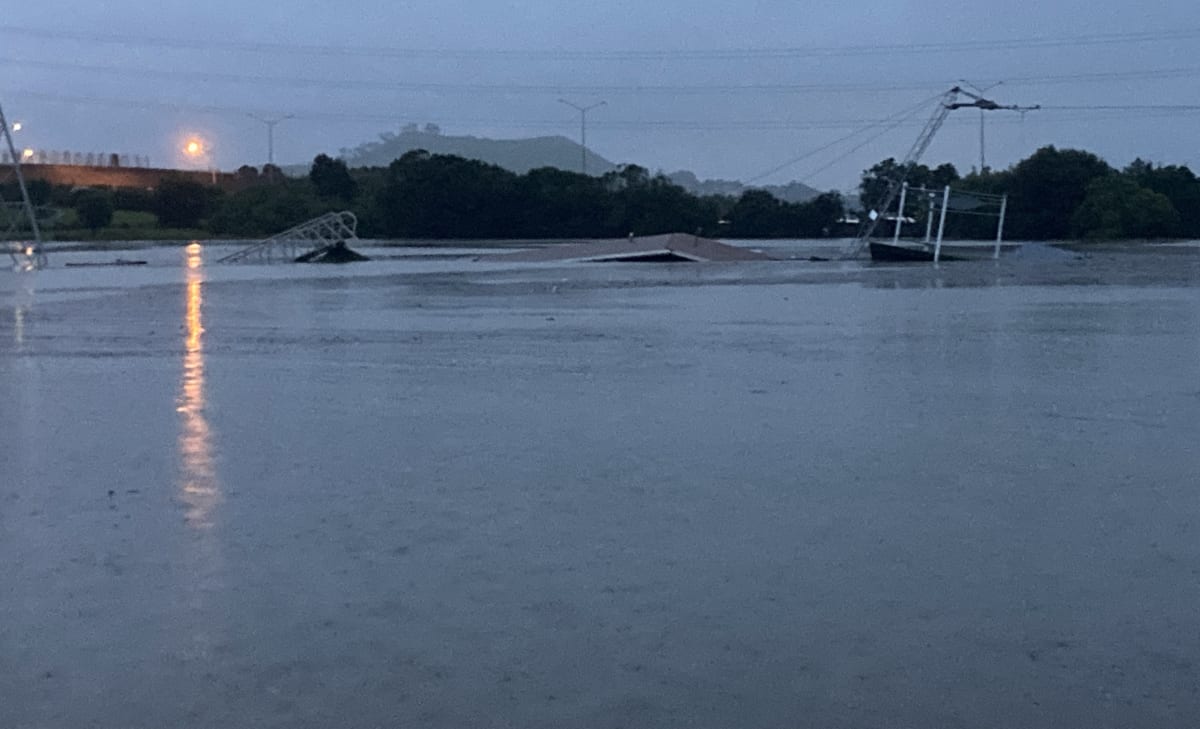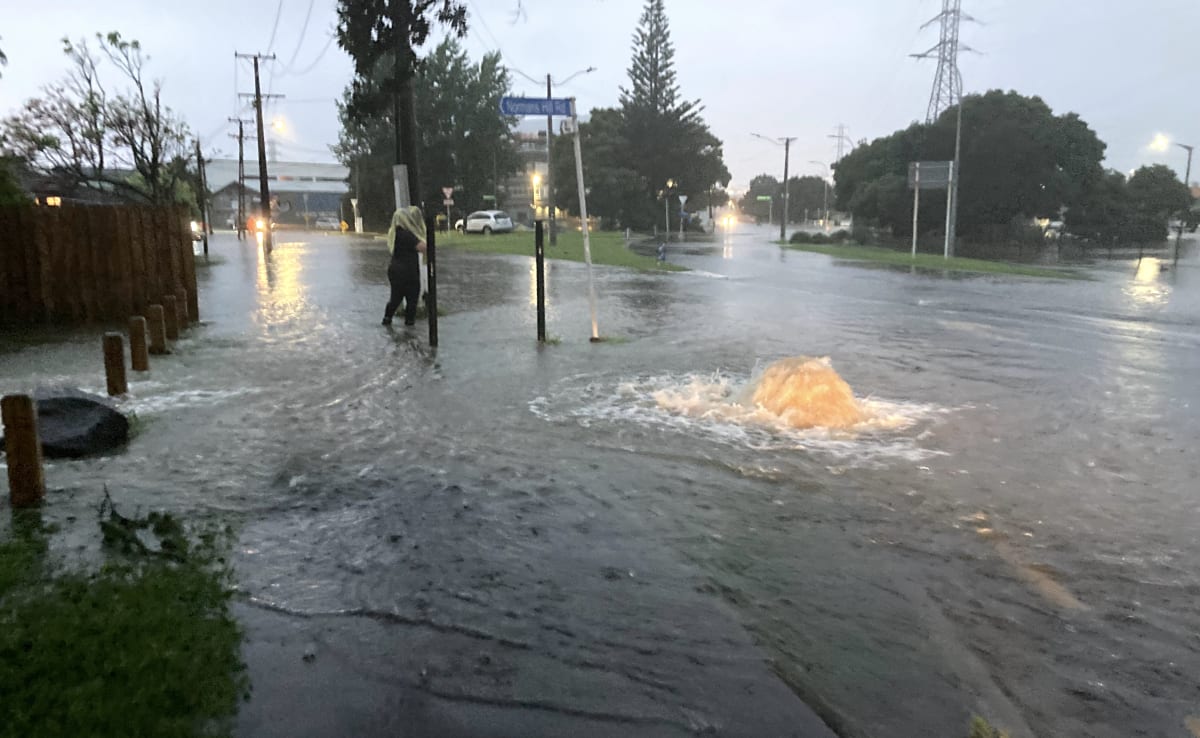
The Prime Minister has gone down to the Beehive bunker to help coordinate the emergency response, as the Insurance Council warns some Aucklanders whose homes and business are flooded face very hard times ahead. Jonathan Milne reports.
Comment: Standing by the south-western motorway, I watched in dismay as hundreds of cars pushed down the onramp onto the flooded southbound lanes. A fire engine, siren wailing, struggled to force its way through the stalled and abandoned vehicles. On the other side, motorists aided by knee-high floodwaters were able to float another abandoned car from an offramp that it had been blocking.
Inexplicably, the sluice gates of Te Tauranga Lagoon had been left closed. The torrents, unable to escape into Manukau Harbour, instead rose over the top of the state highway 20 causeway and low-lying Onehunga properties.
There was a long, wrenching roar – just 10 metres away a large tree crashed onto the road. Once the movement had stopped, I crouched and clambered beneath the torn branches to the battered Corporate Cab caught underneath, but fortunately its driver and passenger had already managed to extricate themselves.
READ MORE: * State of emergency declared in Auckland * AT concert travel muck-up: ‘It’s embarrassing’
The past hours of torrential rain and flooding have been terrible. They have been made even worse by mayhem on the roads as unhappy concertgoers left the cancelled Elton John show, frustrated travellers left the flooded Auckland Airport, and the city's roads and public transport infrastructure collapsed.
These floods are clearly not of the scale of those that Hurricane Katrina wrought upon New Orleans, but there are echoes in the sluggish political response.
Bureaucratic inertia
Thousands of people travelled to an Elton John concert that was only, belatedly, cancelled minutes before he was due to go on stage. There were already 11,000 people inside Mt Smart stadium and 20,000 more making their way through the gates – they had no way to get home again.
With all the main motorways north and south flooded, the transport agency Waka Kotahi tweeted out a "final update" at 7.40pm. "There will be no more updates on this post tonight." (Transport Minister Michael Wood, incredulous, swiftly ordered them back to work).
Auckland Emergency Management, which is run out of the council, paused all public communications for nearly three hours at the peak of the confusion. It just disappeared.
And seemingly, Mayor Wayne Brown fiddled while his Rome flooded.

Despite explicit pleas from councillors and from National leader Christopher Luxon for him to declare a state of emergency (and implicit encouragement from Prime Minister Chris Hipkins) there was no word from him until 10pm.
Finally at 10.20pm he emerged, signed off a state of emergency, and posted a photo of himself doing it. Responding to criticism of his absence, he said his role wasn’t to “rush out with buckets”.
The state of emergency authorised central government to step in – and Hipkins did so immediately. The Defence Force and National Emergency Management Agency have now been deployed; Hipkins has activated the Beehive civil defence bunker, to help with coordination of the emergency response. He was in there being briefed early on Saturday morning.
'Facing a weather bomb'
Like thousands of others in Auckland, Insurance Council chief executive Tim Grafton was bailing out flood waters at his home in Whangaparaoa last night. In the small hours of Saturday morning, he tells Newsroom that the cost of the damage – both insured and uninsured – will be enormous.
"This is going to be a very significant and large and costly event. It is far too early to estimate what the insured losses will be, or the uninsured losses around the city."
It is a “wake-up call” for Auckland and the rest of the country, he says. Extreme weather events are happening increasingly frequently as the climate warns, and New Zealand needs to be better prepared.
"Those who aren't insured, sadly, will be facing some hard times. It's very much a signal event for our larger cities to say, have we got it right in terms of our resilience to events like this?
"We know with climate change that we're going to see more frequent and more impactful events. The tropical cyclones coming down from the Pacific carry a lot more moisture because of climate change warming, so we get a lot more concentrated torrential rain coming down."

Grafton says New Zealanders have to be thinking about how we can reduce our risks. "Not only do these events cause huge amounts of social disruption, but life and safety are put at risk. Sadly, one person has died already on the North Shore as a result of flooding."
"The last thing you should be doing is abandoning insurance and then facing a weather bomb like the one we've experienced in Auckland over the past 24 hours."
For the thousands of Aucklanders whose homes, businesses and vehicles are damaged, Grafton has some immediate advice. If you have safe access to the property, take pictures of the flood damage – but always put your health and safety first.
The next step is to contact your insurer, and get the claim process underway. If your home is uninhabitable (whether you're a renter or a homeowner) your policy should pay for alternative accommodation.
Inundated carpets, furnishings, pantries and fridge/freezers should be treated as contaminated, and safely disposed of. And if electrical wiring in a building or car is potentially affected, get it safely checked out by an electrician.
"You really do need to be careful not to endanger yourselves by running back into houses and not taking care of your health and safety."
New Zealand's most catastrophic event, as measured by privately insured losses, was the $23 billion Christchurch earthquake. Grafton say the Auckland floods will be costly, but are not on that scale.







